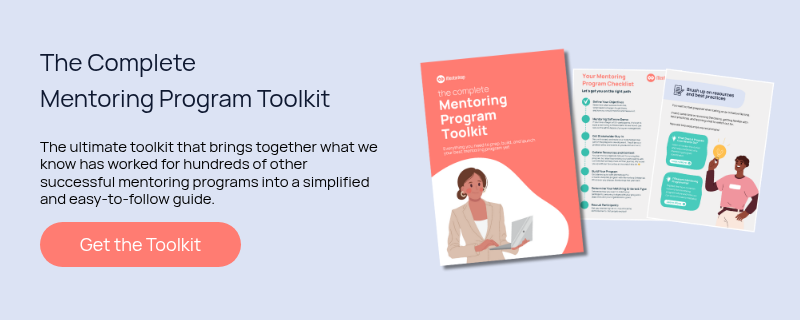The most efficient approach to develop leadership abilities is through mentoring. The road to becoming a leader might at times appear arduous for anyone working inside an organisation who has those goals. The work they desire to accomplish may not necessarily be reflected in the skills they’ve earned along the way. Many employees receive their training through online courses and traditional classroom settings that include copious amounts of paperwork, check boxes, and reading. This type of training can teach someone the fundamentals of managing a team or maintaining systems, but it cannot teach them how to lead effectively.
Leadership programs are, of course, still key to cultivating leaders that are empathetic, create psychologically safe working environments and positively contribute to your organization’s culture of inclusion and success. But mentoring can give individuals timely feedback and learnings that come from real, relevant experience and shared challenges.
Why invest in leadership mentoring and development?
Improve leadership skills
Investing in leadership development actively improves the leadership skills of current and potential leaders within an organization ensuring that the company has a strong and effective leadership team in place. Where traditional learning and development programs fail by focusing on hard skills, mentoring focuses on transferring and strengthening the soft skills required to effectively lead.
Increase employee engagement and retention
Effective leaders help to increase employee engagement and retention. Leadership development programs create a culture where employees feel valued, understood, and motivated. In many cases, effective leaders speed up a culture of psychological safety within a working environment.
Enhance organizational performance
Strong leaders drive an organization’s performance. Investing in a leadership development program, including means of tracking their performance, can help to improve decision-making, problem-solving, communication, and other key leadership skills that can contribute to the company’s success.
Develop a pipeline of leaders
A leadership development program can help to identify and develop the next generation of leaders within the organization. This can help to ensure that the company has a pool of potential leaders who are ready to step into key roles as they become available.
A leadership development program is a key tool to achieve identifying and developing the next generation of leaders within any organization. By providing current and potential leaders with the training and development opportunities they need to hone their skills and gain new knowledge, we can ensure that we have a pipeline of leaders ready to step into key roles as they become available.
By actively identifying potential leaders within an organization and providing them with comprehensive development opportunities such as training, mentoring, and networking, we create a culture that values and encourages leadership development, resulting in a more effective and capable leadership team within the company.
Integrating performance management tools into this process can also help. These tools allow for the continuous assessment and recognition of rising stars, ensuring they are provided with tailored development plans and stretched goals that are critical for their advancement.
Investing in leadership development not only benefits the employees, but also the company as a whole. It leads to better decision-making, improved problem-solving, and better communication – positively impacting the performance and success of any organization.
Get ahead of the competition
In an ever-changing marketplace, leadership development programs ensure that the company’s leaders are equipped with the skills, knowledge, and adaptability to navigate new business challenges.
Build a positive company culture
Good leadership helps build a positive company culture and fostering a culture of development and growth can have a positive impact on the overall performance of the organization.
Compliance and legal considerations
In some industries, investing in leadership development programs is an important aspect of compliance and legal considerations. Organizations may be required to provide training and development opportunities to employees in order to meet legal and regulatory requirements.
Investing in leadership development programs for most organizations is a strategic move. Not only does it strengthen the leadership capabilities within the company but also assists employee engagement and retention, encourages better business performance and even legal considerations.
What is Leadership Mentoring?
Leadership mentoring is a relationship in which a more experienced leader, known as a mentor, helps guide and advise a less experienced leader, known as a mentee, in developing their leadership skills and abilities. The mentor provides guidance and support to the mentee, helping them to identify and overcome challenges, set and achieve goals, and develop the skills and knowledge they need to be successful leaders.
Mentoring relationships can take many forms and can occur in a variety of settings, such as in the workplace, in educational institutions, or in professional organizations. The goal of leadership mentoring is to help the mentee become a more effective and confident leader, and to foster their growth and development over time.
How do leadership mentoring programs differ from general mentoring programs?
Leadership mentoring programs are specifically tailored to help individuals develop the skills and knowledge required to become successful leaders, and as such, may differ in some key ways from general mentoring programs. Some of these differences include:
1. A focus on leadership development: Leadership mentoring programs are designed to help individuals develop the specific knowledge and skills necessary for leadership, as opposed to general mentoring programs which may cover a broader range of topics and skills. This can include areas such as decision making, communication, team management, strategic thinking, and more.
2. Incorporating leadership assessments: Leadership mentoring programs may also use assessments such as personality tests or 360-degree evaluations to help mentors and mentees identify areas of strength and areas for improvement. If you’ve got a performance management tool that can continuously track progress and provide data-driven insights, then you’re onto a good thing. Having an asset that can do these things allows for dynamic adjustments to the development plans of mentees, ensuring they are always aligned with organizational goals and leadership needs.
3. Involvement of high-level leaders: Leadership mentoring programs may also involve higher-level leaders and executives as mentors, as they will have the experience and knowledge to guide the development of future leaders.
4. Long-term engagement: Leadership mentoring programs may also be structured as long-term engagements, with mentors and mentees meeting regularly over an extended period of time in order to build a strong and lasting relationship.
5. Focus on real-world problems: Instead of focusing on general skills or theoretical concepts, leadership mentoring programs often deal with real-world problems that the mentee might encounter in the workplace, providing guidance and support on how to approach and solve these problems.
How to use leadership mentoring to cultivate better leaders in your organization
- Establish a formal mentoring program: Setting up a formal mentoring program can provide structure and support for the development of leadership skills. This could include identifying potential mentees, matching them with experienced mentors, and setting clear goals and expectations for the relationship.
- Incorporate leadership development into the mentoring program: Make sure that the mentoring program includes specific elements that focus on leadership development, such as training on key leadership skills and regular feedback on leadership performance.
- Encourage cross-functional mentoring: Pairing mentees with mentors from different departments or teams can expose them to different perspectives, skills, and approaches to leadership, which can be beneficial for their personal and professional development.
- Provide ongoing support and resources: Providing mentees with ongoing support and resources, such as books, webinars, workshops, or networking opportunities, can help them continue to develop their leadership skills after the mentoring relationship has ended.
- Make mentoring a part of the culture: Creating a culture of mentoring within the organization can help to ensure that the development of leadership skills is viewed as an ongoing process that is valued and supported by the organization. Encourage senior leaders to be mentors, or to be mentored themselves, as it sets a great example for the rest of the organization.
- Measure the success of the mentoring program: Establishing metrics to evaluate the effectiveness of the mentoring program, such as increased retention rates, improved employee satisfaction, or increased productivity, can help the organization to determine if the program is achieving its goals and make adjustments as needed.
- Involvement of high-level leaders: Inviting the participation of high-level leaders and executives as mentors, can bring valuable experience and knowledge to the mentoring program, they will be best suited to guide the development of future leaders and can help them to fast track their learning.
How to use integrated performance management to cultivate better leaders in your organization
If you’re aiming to nurture effective leadership within your organization, using performance management tools, like Rippling, can be transformative. These tools provide a structured and systematic approach to developing leadership qualities, ensuring that the potential of each leader is fully realized.
- Continuous feedback and real-time assessments: Traditional performance reviews are fine. They’re useful and have their place. But if you have a platform that enables continuous feedback and real-time assessments, that’s even better. This allows for immediate recognition of achievements and swift correction of missteps, facilitating a dynamic growth environment. This also means leaders can receive timely insights into their performance, including areas where they excel and aspects needing improvement, ensuring their development is ongoing and responsive to actual work scenarios.
- Goal alignment: By setting clear and measurable goals through a platform, leaders can better understand their contributions to the company’s success. This alignment helps with clarifying expectations and prioritizing tasks that have the most impact, thus fostering a sense of purpose and direction among emerging leaders.
- Customizable development plans: Every leader has unique strengths and areas for improvement. Your performance management tool can assist with creating customized development plans that cater to specific needs.
- Enhanced decision-making: Integrated performance management tools that allow you to collect and analyze comprehensive data can also be incredibly useful. Access to this data helps leaders make informed decisions that are backed by trends and evidence, enhancing their strategic thinking capabilities.
- Fostering a culture of accountability and transparency: By leaning on integrated performance management, organizations can foster a culture where feedback is openly given and received. This transparency not only improves relationships among staff but also increases accountability, encouraging leaders to own their actions and decisions.
- Scalability for growing organizations: As organizations grow, the challenges of maintaining consistent leadership training and development also increase. Performance management solutions ensure that no matter how much the company expands, its leadership development efforts remain uncompromised.
Book a Rippling demo today to see how their full-suite HCM, including innovative performance management can help you develop your next generation of leaders.
What does good leadership mentoring look like?
We’ve compiled some of our best advice to dive deeper into the qualities and attributes of good leadership mentors, explore below:
- They care about the next generation’s success
- They’re self-aware and enthusiastic
- They set a good example as a positive role-model
- They’re intentional with their time
- They share experience, rather than advice
- They get uncomfortable
- They’re life-long learners
- They provide quality feedback
- They’re open and active listeners
- They extend their network
Looking for more inspiration?
Here’s a short list of books and videos to explore on Leadership Mentoring:
Books on Leadership Mentoring
- “The Mentor Leader: Secrets to Building People and Teams That Win Consistently” by Tony Dungy
- “The 360 Degree Leader: Developing Your Influence from Anywhere in the Organization” by John C. Maxwell
- “Leadership and Self-Deception: Getting out of the Box” by the Arbinger Institute
- “The Art of Possibility: Transforming Professional and Personal Life” by Rosamund Stone Zander, Benjamin Zander.
- “The Power of Intentional Leadership: How to Develop and Coach Your Team for Success” by John C. Maxwell
- “Leaders Eat Last: Why Some Teams Pull Together and Others Don’t” by Simon Sinek
TED talks on Leadership Mentoring
- Simon Sinek: “Why good leaders make you feel safe” (TED@Work, 2017)
- Roselinde Torres: “What it takes to be a great leader” (TED@BCG, 2013)
- Brené Brown: “The power of vulnerability” (TED, 2010)
- Marcus Buckingham: “The one thing great managers do differently” (TED@Cisco, 2017)
Launch a mentoring program for aspiring leaders
One of the finest ways to make the most of your company’s largest asset—its employees—is to train up future leaders.
You can spot future leaders in your ranks when each of your departments has a mentorship network that enables staff to interact and learn.
One of the finest methods to improve teamwork is to learn from peers and mentors.
See how the Institute of Managers and Leaders ANZ used mentoring to open new leadership opportunities and broaden career horizons for their members.






